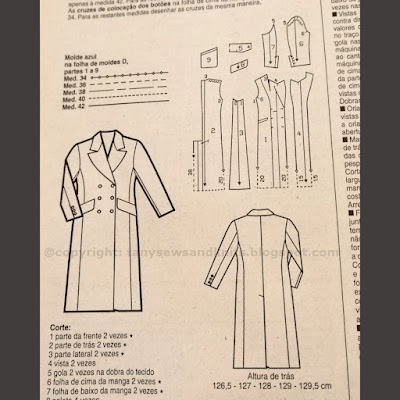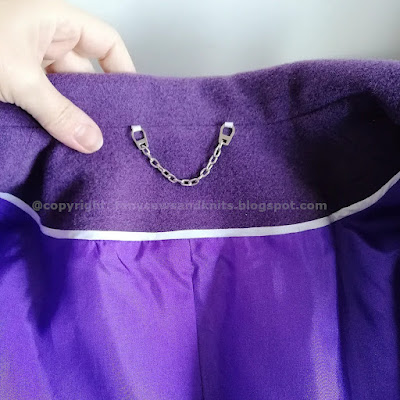EN Summary: In this article you'll find detail photos of the finished coat, pattern details and links to previous related articles. Keep reading the full article on tanysewsandknits.blogspot.com.
---
PT Sumário: Neste artigo irão encontrar fotos e detalhes do sobretudo terminado, detalhes do molde e enlaces para artigos anteriores relacionados. Continuem a ler o artigo completo em tanysewsandknits.blogspot.com.
EN: The pattern is from Burda International magazine 3/95, model 901 that I've traced in size 40. It's a fully lined masculine-style double-breasted overcoat with large lapels, slanted hip pockets with large flaps, tailored sleeves with buttoned vents and back vent. I have sewn this overcoat back in the 90's; at the time I used camel wool and a golden satin lining. I wore that coat for many years and I wanted to make it again, this time using a purple coating fabric (64% viscose 36% wool) with a double-face (inner brushed, outer crepe-like texture) from Fabrics4Fashion (find it here). I used the brushed face as the right side, because I loved the subdued purple color more than the bold purple of the crepe-like side. The buttons were bought at a local notions store (read my initial notes on the fabric, buttons, bound buttonholes and large flap pockets here).
---
PT: O molde é da revista Burda Internacional 3/95, modelo 901 que cortei no tamanho 40. Trata-se de um sobretudo assertoado de linha masculina completamente forrado, com gola/lapelas exageradas, bolsos inclinados com paletas grandes, mangas de alfaiate de duas peças com abertura abotoada e racha atrás. Já tinha confecionado este modelo nos anos 90, na altura com um tecido de lã camel e forro de cetim dourado. Usei esse casaco por muitos anos e apeteceu-me fazê-lo de novo, desta vez usando um tecido para casaco de cor roxa (64% viscose 36% lã) com duas faces (a interior de efeito escovado e a exterior com textura tipo crepe), que encomendei da Fabrics4Fashion (
aqui). Resolvi usar a face escovada no direito pois gostei mais da cor menos intensa em comparação com a face em crepe. Os botões foram comprados localmente, na retrosaria Novo Estilo - Aveiro. Podem ler as minhas notas iniciais sobre o tecido, botões, casas avivadas e bolsos clicando
aqui.

EN: Below there's the line drawing and the pattern outline; observe that the coat has side panels. My only alterations to the pattern were for accommodating to my method of sewing tailored vents with mitered corners and to cut the lining accordingly. Same as Burdastyle magazine patterns, the pattern doesn't include seam/hem allowances and there are no separate pattern pieces for the lining, except the front panel which has the lining outlined. The back lining piece should be drawn with a vertical ease fold above the waist; I also drafted a back neckline facing, reducing its width from the back lining pattern piece. My other pattern alteration was cutting the undercollar in two bias mirrored pieces instead of a single piece cut on the fold.
I used 3/8" seam allowances and 2" hem allowances on the body of the coat. The back vent facings were cut with the same width to make a perfect mitered corner on the vent top layer. The sleeves hem allowances were cut a little narrower (13/8"), same of the sleeve vent facings.
Regarding the interfacing, I used fusible interfacing on the facings, vent facings, hem allowances and buttonhole placement areas. I didn't interface the front of the coat entirely as suggested, and instead reinforced the upper chest with a chest shield. I also reinforced the lapels and taped the roll line, neckline and front edges. The armhole area and neckline were also fused and taped both on the fronts, side and back panels. My fabric has a lot of body and I just wanted to reinforce the overcoat´s structure at the collar, shoulders and lapels to make it hang perfectly while keeping a certain flow on the bottom.
---
PT: Mais abaixo têm o desenho técnico e o esquema do molde, onde podem observar que o casaco tem um painel lateral. As minhas alterações ao molde foram para adaptar ao meu método de confeção de aberturas com um canto mitrado na parte superior, tendo o forro que ser adaptado também. Como em todos os moldes da revista Burdastyle, estes não vêm com margens de costura e bainha incluídas nem com o molde pronto para o forro (exceto a parte da frente que trás delineada a peça do forro). As costas do forro deverão ser cortadas com uma prega no meio acima da cintura para dar folga ao movimento de vestir o sobretudo; também desenhei uma peça suplementar para a vista do decote nas costas, descontando a sua largura da parte em forro das costas. Além destas alterações cortei a parte inferior da gola em duas partes espelhadas em viés, em vez de na dobra como indicado.
Usei margens de 1cm e 5cm de margens de bainha no casaco, exceto nas mangas onde as margens de bainha são de 4cm. As vistas das aberturas devem ser cortadas na mesma largura para depois ser mais fácil construir os cantos mitrados.
Quanto aos reforços de entretela, usei entretela de colar a ferro nas vistas incluindo as das aberturas, bainhas e áreas de aplicação das casas de botão. Não entretelei as frentes completamente como sugerido porque este tecido já tinha bastante corpo; assim reforcei com entretela apenas a área dos ombros peito e cavas, não esquecendo também de aplicar fita de entretela nas cavas, decote, orlas da frente e linha da dobra das lapelas. As lapelas também foram reforçadas com entretela termo-colante para manterem melhor a sua forma. Desta forma o casaco tem estrutura nos ombros para sustentar o seu caimento, mas mantém uma certa ligeireza na parte de baixo.
EN: The resulting coat clearly has masculine vibes and is oversized enough, without overpowering the feminine figure.
---
PT: O resultado final tem claramente linhas masculinas e "oversized" na medida certa, sem sobrecarregar demasiado a figura feminina.
EN: The large collar and lapels are perhaps the only deviation from a strict classic masculine overcoat.
---
PT: A gola e lapelas exageradas são talvez o único pormenor que desafia as linhas estritamente clássicas e masculinas deste sobretudo.
EN: I opted for bound buttonholes and a color matched lining with white piping:
---
PT: Optei por casas avivadas e um forro à cor com vivo branco:
EN: The armholes are deep and the sleeves are quite roomy, so the overcoat can be worn over several layers of clothes, including a blazer or a heavy sweater.
---
PT: Sendo um sobretudo, as cavas são profundas e as mangas largas o suficiente para ser usado sobre várias camadas de roupa como um blazer ou um camisolão grosso.
EN: The large flaps on the slanted pockets balance the large collar and lapels of the coat:
---
PT: As paletas "gigantes" nos bolsos inclinados contrabalançam a gola e lapelas exageradas:
EN: Here are the cuffs and buttoned vents; I've written an article showing the sleeves in much detail (find it here). ---
PT: Aqui têm as aberturas abotoadas das mangas; escrevi um artigo com os detalhes da confeção que podem consultar clicando
aqui.
EN: The overcoat is very minimalistic seen from the back.
---
PT: O sobretudo é bastante minimalista visto de trás.
EN: The collar rolls down beautifully, helped by its bias undercollar and pattern pieces cut taking into account that the roll of the fabric (the upper collar should be slightly wider than the undercollar, otherwise the under collar would show).
---
PT: A gola rola para baixo de forma harmoniosa, graças à gola inferior ser cortada em viés e às peças do molde terem em consideração a curva do tecido (a gola superior deve ser ligeiramente maior, de outra forma a gola inferior iria "espreitar" debaixo).
EN: Here's the back vent; I adapted the pattern so I could construct it the same way as the sleeve vents:
---
PT: Aqui têm a racha atrás; adaptei o molde para a poder confecionar exatamente da mesma forma que as aberturas das mangas:
EN: The top side has a mitered corner:
---
PT: O lado que se sobrepõe tem um canto mitrado:
EN: The under side extension is completely lined and its edge is under-stitched:
---
PT: O lado inferior extende-se sob a abertura e é completamente forrado, além de levar o pesponto de girar na orla:
EN: Here's my added back neckline facing (there wasn't one in this pattern) and a chain hanging loop:
---
PT: Aqui podem ver a vista do decote atrás que acrescentei e a corrente de pendurar o sobretudo:
EN: This overcoat, as its predecessor, will surely serve me well in the next few years; it's a classic design that never goes out of fashion, while the masculine style is trending strong right now.
Notably I had some time to photograph myself wearing this overcoat so you guys shouldn't miss my outfit post on Tany et La Mode (check it out here). Thank you all for visiting!
---
PT: Este sobretudo, tal como o seu predecessor, será bastante usado nos anos que aí vêm; é de um estilo clássico que não sai de moda, e além do facto das linhas masculinas estarem bastante na moda.
Notavelmente tive algum tempo livre hoje e consegui fotografar-me a usar o sobretudo; não percam o artigo com o look do dia no Tany et La Mode (cliquem aqui). Obrigada a todos por aparecerem!






















4 comments:
Bonjour,
bravo , le col tombe mieux que sur la photo du catalogue qui décolle !
Ca me donne envie de faire le même , j' ai un tissu à utiliser et je ne savais pas quel modèle prendre.
Merci pour l' idée, j' ai tous les magazines en stock.
Voilà du travail en perspective.
Merci pour ce blog !
Beautifully made, gorgeous and envious of you tailoring skills
Elka: Merci beaucoup! Ça me fait plaisir de savoir que mes cousettes vous inspirent! Je suis sûr que ce modèle vous plairá, c'est un très beau manteau :)
I just love this coat, so beautiful. the design lines make it a great choice for a classic coat and the color is fantastic
Post a Comment